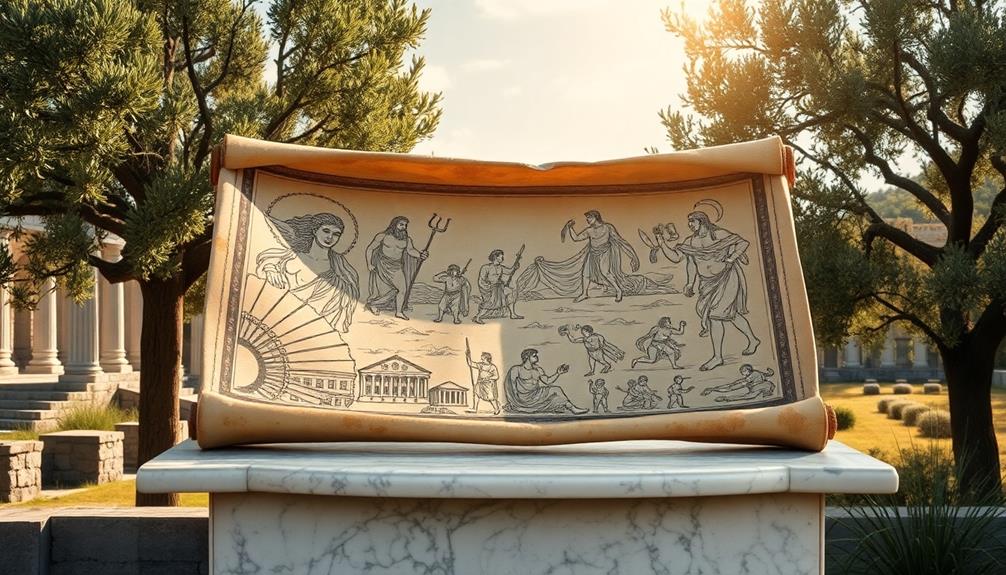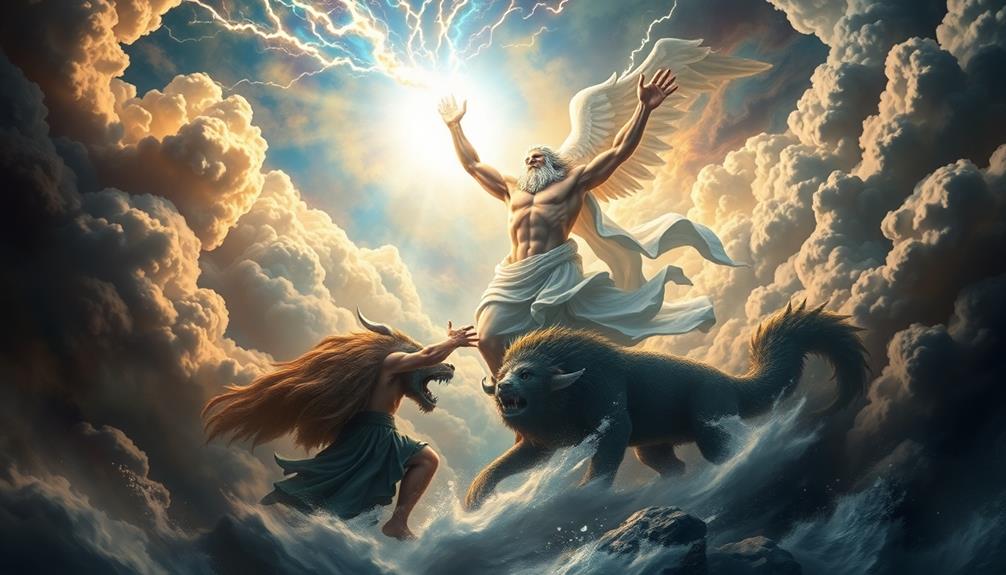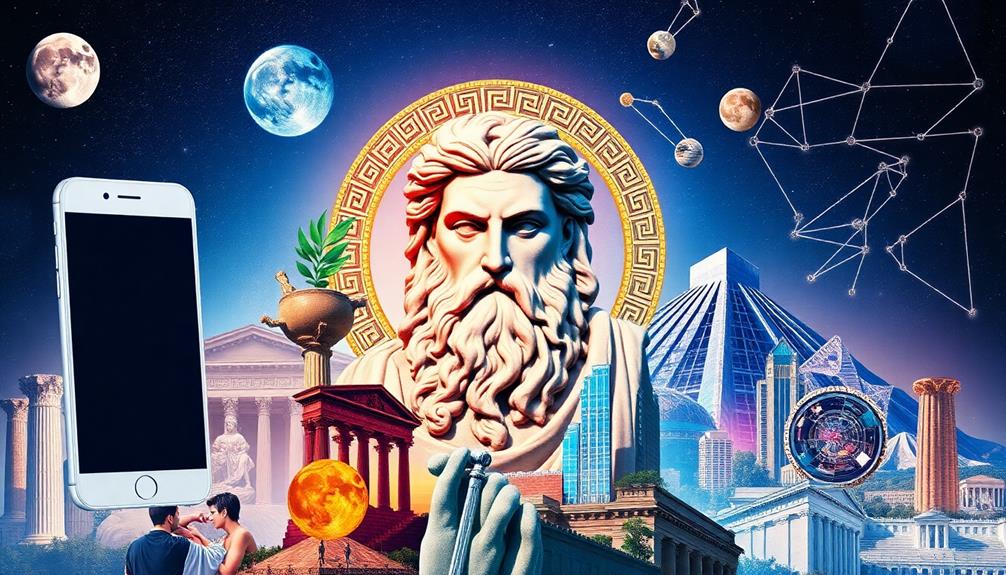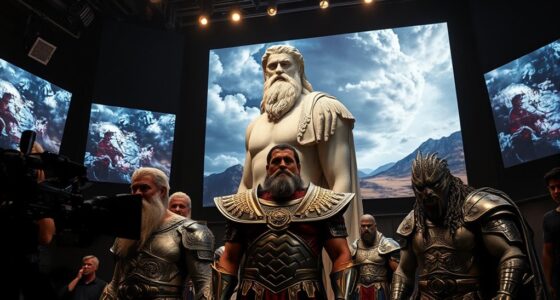Ancient Greek myths hold secrets that go beyond entertaining stories. They weave together cultural values, ethical dilemmas, and powerful moral lessons relevant today. You'll discover how characters like Odysseus and Arachne reflect the consequences of hubris and the importance of humility. The divine intervention from gods emphasizes the ongoing struggle between virtue and vice in human life. Each myth serves as a mirror, showing you the societal norms and personal choices shaping destinies. As you uncover these layers, you'll find deeper insights into the connections between ancient beliefs and modern moral discussions. There's so much more waiting for you.
Key Takeaways
- Greek myths serve as cautionary tales, emphasizing the dangers of hubris and the importance of humility in human conduct.
- Divine intervention in mortal lives illustrates the balance of favor and wrath, showcasing the consequences of prideful actions.
- Characters like Hercules exemplify the struggle between virtue and vice, highlighting the significance of making ethical decisions.
- Myths explore themes of creation and change, reflecting societal values and the cyclical nature of life and death.
- The timeless moral lessons found in myths resonate with contemporary ethical dilemmas, providing frameworks for modern discussions on morality.
Historical Significance of Myths

Ancient Greek myths aren't just entertaining tales; they play an important role in understanding the historical significance of Greek culture. Greek mythology served as a crucial means of cultural transmission, preserving the values, beliefs, and historical narratives that shaped society across generations.
These myths often reflected societal norms and ethical dilemmas, delivering cautionary tales that highlighted the consequences of human actions, especially the dangers of hubris.
Myths were integral to religious practices, with rituals and festivals dedicated to gods like Zeus and Athena, reinforcing social cohesion and identity. They weren't merely stories; they were educational tools, teaching virtues such as bravery and wisdom through the adventures of figures like Hercules and Odysseus.
These narratives emphasized the importance of fate and divine intervention, offering insights into the human condition.
The enduring nature of Greek mythology has left a significant mark on Western literature, art, and philosophy, shaping cultural narratives and moral discussions that continue today.
Key Themes and Lessons

When you explore ancient Greek myths, you can uncover powerful moral lessons that resonate even today.
These stories often highlight the influence of divine forces on human actions, reminding you of the consequences of pride and ambition.
Moral Lessons Explored
Greek myths are rich with moral lessons that resonate across time, offering insights into human behavior and ethics. These stories serve as cautionary tales, warning against hubris and excessive ambition.
Take Icarus, for example; his fate illustrates the dangers of overreaching and ignoring limits. Similarly, Odysseus' arrogance after escaping the Cyclops leads to Poseidon's wrath, showing how excessive pride can invoke nemesis, or divine retribution.
Through these narratives, myths encourage self-reflection and moral decision-making. They explore ethical dilemmas faced by characters, like Hercules, who must choose between a life of pleasure or hardship. This highlights that virtue isn't just innate; it's a conscious choice you make.
The contests of the gods, such as Athena and Poseidon's rivalry for Athens, reflect societal values and the significance of legacy. Each choice shapes not just individual destinies but also the community's values.
Greek myths remind you that every decision has consequences, both morally and socially. By grappling with these themes, you can better understand the importance of humility, respect for authority, and the ethical paths you choose in life.
Divine Influence Examined
How do the gods shape human experiences in mythology? The Greek Gods play a pivotal role in influencing mortal lives, often demonstrating the delicate balance between divine favor and wrath.
You'll notice key themes that emerge throughout these myths:
- Divine Intervention: Gods like Athena guide heroes such as Odysseus, while Poseidon punishes those who exhibit hybris, reinforcing moral lessons.
- Consequences of Pride: Characters who defy the gods, like Arachne, face nemesis, illustrating that excessive pride can lead to ruin.
- Cyclical Existence: Myths like Persephone's abduction reveal the intertwined fates of gods and mortals, delving into themes of life and death.
These stories highlight that the Greek Gods aren't just distant figures; they actively participate in human affairs.
You must navigate your relationship with them to find success or avoid their punishment. The contest between Athena and Poseidon for Athens underscores the importance of wisdom over brute strength in leadership.
Ultimately, understanding these divine influences enriches your grasp of ancient Greek myths and their timeless lessons.
The Concept of Hubris

Hubris stands out as a powerful theme in ancient mythology, representing the excessive pride that often leads mortals to challenge the gods. This concept serves as a vital moral lesson, reminding you of the dangers of overestimating your abilities.
Take Odysseus, for instance. After escaping the Cyclops, he boasts about his identity, provoking Poseidon's wrath and resulting in a long and arduous journey home. His hubris not only invites punishment but also illustrates the peril of defying divine authority.
Another vivid example is Arachne, who claims to be a superior weaver to Athena. Her arrogance leads to her transformation into a spider, showcasing how hubris can bring about dire consequences.
In these myths, you see a clear contrast between hubris and humility, emphasizing the importance of recognizing your limitations. The cyclical nature of hubris and nemesis highlights that prideful acts invite retribution, serving as a cautionary tale for all.
Ultimately, these stories remind you to respect the divine order and acknowledge human fallibility. Hubris may feel empowering in the moment, but it often leads to downfall, reinforcing the timeless lesson that pride comes before the fall.
Divine Intervention in Stories

In ancient myths, the influence of the gods often shapes the destinies of mortals, illustrating the profound impact of divine intervention. This fascinating aspect of mythology reveals how the gods interact with humans and the consequences that follow.
Here are three key examples of divine intervention in Greek stories:
- Athena and Odysseus: Athena's guidance helps Odysseus navigate the challenges he faces on his journey home from the Trojan War.
- Arachne's Punishment: When Arachne boasts about her weaving skills, she defies Athena and is transformed into a spider as punishment for her hubris.
- Niobe's Downfall: Niobe's excessive pride ignites divine wrath, resulting in tragic consequences for her and her family.
These examples show how the gods wield their power, rewarding loyalty while punishing those who disregard their authority.
The relationship between gods and mortals in these myths is complex, emphasizing the importance of piety and respect.
Ultimately, divine intervention not only drives the narratives of individual characters but also reflects the broader societal values of ancient Greece, making these stories both compelling and cautionary.
Myths of Creation and Change

Many ancient Greek myths explore the themes of creation and change, disclosing how the cosmos and human existence intertwine. When you're learning about Greek myths, you encounter stories that illustrate fundamental truths about life.
Take Athena's contest with Poseidon, for instance; it highlights the democratic choice, showing how citizens preferred her olive tree, symbolizing peace and prosperity, over Poseidon's saltwater spring.
Persephone's abduction by Hades represents the cyclical nature of life and death. Her annual return signals spring, embodying renewal and growth.
Similarly, the creation myth of Gaia and Uranus reveals the power struggles that shape existence, emphasizing how new generations arise from conflict.
Prometheus's act of stealing fire from the gods not only signifies creation and transformation but also serves as a cautionary tale about defying divine authority, resulting in harsh punishment.
The Eleusinian Mysteries, rooted in the tale of Demeter and Persephone, explore themes of death and rebirth, mirroring the ancient Greeks' beliefs in the afterlife and life's continuity.
Together, these myths offer profound insights into the human experience, making your exploration of Greek mythology all the more enriching.
Virtue and Vice Explored

Greek mythology vividly illustrates the ongoing battle between virtue and vice, revealing how choices shape one's character. Characters like Hercules and Odysseus serve as prime examples of how conscious decisions determine moral integrity. Their stories remind us that virtue isn't just an inherent trait; it's a choice we make every day.
Here are three key lessons from these myths:
- Consequences of Hubris: Arachne's transformation into a spider highlights how excessive pride can lead to dire outcomes, serving as a cautionary tale against the perils of vice.
- Ethical Decision-Making: Myths celebrate heroes who embody virtuous actions, emphasizing the importance of good citizenship and moral choices in every community.
- Temptations and Trials: Odysseus's journey reflects the struggle to maintain virtue amidst temptations, showcasing the challenges we all face in upholding our values.
Ultimately, these ancient tales compel you to reflect on your own life, encouraging you to choose virtue over vice. They remind us that our choices not only define our character but can also echo through generations.
Modern Relevance of Myths

Ancient Greek myths still hold powerful lessons that resonate with you today, offering insights into morality that shape your understanding of right and wrong.
They influence modern literature and storytelling, weaving their themes into the fabric of contemporary narratives.
Furthermore, these myths connect you to a rich cultural identity, reminding you of the heritage that continues to inform your values and beliefs.
Timeless Moral Lessons
Throughout history, people have turned to myths for guidance on moral dilemmas, and the lessons embedded in these stories remain relevant today. Ancient Greek myths offer insights that resonate with modern life, teaching us valuable lessons worth remembering.
Here are three key moral takeaways:
- The Dangers of Hubris: In the tale of Icarus, excessive pride leads to his tragic fall, reminding you to stay humble and recognize your limits.
- Choices Define Character: Hercules shows that virtue and vice are choices, not innate traits, emphasizing the importance of conscious ethical behavior in your daily life.
- Respecting Natural Order: Persephone's story highlights the cycles of life and death, urging you to understand and value the natural world, which aligns with today's environmental concerns.
These themes resonate in many contemporary discussions, from governance to personal responsibility.
If you're interested in exploring these ideas further, consider picking up a book on Greek myths. They illuminate not just ancient beliefs, but also the moral fabric that continues to shape our society.
Embracing these timeless lessons equips you to navigate today's challenges with wisdom and integrity.
Influence on Literature
The enduring power of mythology continues to shape modern literature, weaving rich narratives that resonate with contemporary audiences. Greek mythology has profoundly influenced countless authors, from Shakespeare to modern writers like Madeline Miller. By reinterpreting these ancient tales, they explore themes like identity, power dynamics, and moral dilemmas, making the myths relevant today.
The archetypes found in Greek myths, such as the hero's journey exemplified by Odysseus and Hercules, shape storytelling structures in your favorite books. These familiar patterns allow you to connect with age-old narratives on a personal level.
Additionally, Greek myths serve as rich sources for examining human nature and ethical decision-making. Works like "The Song of Achilles" highlight moral lessons that resonate with modern discussions about virtue and vice.
Moreover, adaptations in modern media—films, graphic novels, and more—showcase the lasting impact of these myths. These retellings often spotlight themes of love, betrayal, and redemption, issues that still matter today.
Cultural Identity and Heritage
Myths serve as a mirror reflecting our cultural identity and heritage, revealing values and beliefs that have shaped Western civilization for centuries.
By connecting with these ancient tales, you can uncover insights that resonate deeply within modern society. Here are three ways Greek myths maintain their relevance today:
- Moral Lessons: The trials of characters like Odysseus teach us about bravery and virtue, offering ethical frameworks that still guide our decisions.
- Democratic Principles: Myths such as Athena's contest with Poseidon illustrate the roots of governance and civic responsibility, echoing the values that underpin contemporary democracy.
- Themes of Transformation: Stories like Persephone's journey highlight growth and the cyclical nature of life, providing a lens through which to understand personal change and societal evolution.
Frequently Asked Questions
Is There Any Proof That Greek Mythology Is Real?
Despite countless archaeological finds, like over 500 ancient temples, there's no concrete proof that Greek mythology is real. Instead, these myths reflect cultural beliefs and experiences, offering insights rather than historical facts about the ancient Greeks.
What Is the Biggest Mystery in Greek Mythology?
You'll find the biggest mystery in Greek mythology lies in the origins of the Titans and their relationship with the Olympian gods. Their complex stories, particularly Kronos swallowing his children, spark endless intrigue and debate.
What Is the Most Unknown Greek Myth?
You might find Arachne's tale quite unknown. This skilled weaver dared challenge Athena, only to face a harsh transformation into a spider, illustrating the perils of hubris and the consequences of defying the gods.
What Is the Most Scariest Greek Myth?
You might say Medusa's story is a cautionary tale about beauty's darker side. Her gaze transforms the unprepared into stone, reflecting the terrifying consequences of vanity and the chilling repercussions that await those who cross divine boundaries.
Conclusion
In revealing the secrets of ancient Greek myths, you've discovered a treasure trove of wisdom that still resonates today. These stories act as mirrors, reflecting the human experience with their themes of hubris, virtue, and divine intervention. They remind you that, just like the gods and heroes of old, you too navigate life's complexities. Embracing these timeless lessons can guide you through your own journey, illuminating the path ahead with insights that transcend the ages.









